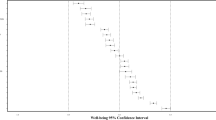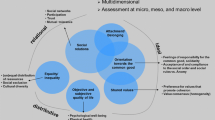Abstract
The effect of decentralisation reform on citizen happiness in the context of a developing country remains under-investigated. We study this effect by examining the experience of Indonesia. Data comes from the Indonesian Family Life Survey 2007 which comprises face-to-face interviews with the adult population in Indonesia (N individuals = 29,024, N districts = 262). Multilevel analysis is used to examine the effect of fiscal and political decentralisation on citizen happiness, and shows that fiscal decentralisation is significantly associated with citizen happiness, while political decentralisation is not; these are robust to the inclusion of individual and district variables related to happiness. The findings suggest that decentralisation increases the happiness of citizens through the improved capacity of districts to deliver public services, rather than through the improved opportunities of citizens to engage in direct political participation.


Similar content being viewed by others
Notes
In 2009, Freedom House classified 119 out of 193 countries as electoral democracies. There is a significant difference between an ‘electoral democracy’ and a ‘liberal democracy’. In the former, reasonably open elections can coexist with serious defects in the implementation of individual rights, the rule of law and other preconditions crucial for a free society. Liberal democracies, by contrast, enjoy free, fair and competitive elections, but also a large catalogue of civil liberties. According to Freedom House, only 89 of the 119 electoral democracies were classed as liberal democracies in 2009. Interestingly, this included Indonesia.
Podes census is conducted by the Indonesian Central Bureau Statistics every 2 years. We use Podes 2006 as there is no Podes census in 2007.
The percentage of unemployment in IFLS 2007 is lower compare with the World Bank 2007 unemployment data (9.1 %). One explanation could explain these differences are that both IFLS and World Bank use difference measure of unemployment. In the IFLS survey respondent is asked during the past week, did you do work for pay. This question is used to measure unemployed status. We checked this number with the Indonesian Socio economic survey (Susenas) 2007 which also used the same question. The result is same.
References
Abdel-Khalek, A. (2006). Happiness, health, and religiosity: Significant relations. Mental Health, Religion and Culture, 9(1), 85–97.
Argyle, M. (2001). The psychology of happiness. East Sussex: Routledge.
Asian Development Bank. (2012). Regional development in Indonesia after decentralisation. Jakarta: Asian Development Bank.
Aspinall, E., & Mietzner, M. (2010). Problems of democratisation in Indonesia: Election, institutions, and society. Singapore: ISEAS.
Bardhan, P., & Mookherjee, D. (2000). Capture and Governance at local and national levels. American Economic Review, 90(2), 135–139.
Bjørnskov, C., Dreher, A., & Fischer, J. (2008). On decentralization and life satisfaction. Economics Letters, 99(1), 147–151.
Bjørnskov, C., Dreher, A., & Fischer, J. (2010). Formal institutions and subjective wellbeing, Revisiting the cross-country evidence. European Journal of Political Economy, 26(1), 419–430.
Blanchflower, D., & Oswald, A. (2004). Wellbeing over time in Britain and the USA. Journal of Public Economics, 88(1), 1359–1386.
Blanchflower, D., & Oswald, A. (2008). Is well-being U-Shaped over the life cycle? Social Science and Medicine, 66(8), 1733–1749.
Choi, N. (2004). Local elections and party politics in Indonesia. Contemporary Southeast Asia, 26(2), 280–301.
Clark, A., & Oswald, A. (1994). Unhappiness and unemployment. The Economic Journal, 104(424), 648–659.
Clark, A. & Senik, C. (2011). Will GDP growth increase happiness in developing countries? IZA Discussion Paper No. 5595.
Coase, R. (1960). The problem of social cost. Journal of Law and Economics, 3(1), 1–44.
Davoodi, H., & Zou, H. (1998). Fiscal decentralization and economic growth: A cross-country study. Journal of Urban Economics, 43(2), 244–257.
Deaton, A. (2001). Health, inequality, and economic development. Working Paper 8318, National Bureau of Economic Research.
Deaton, A., & Zaidi, S. (2002). Guidelines for constructing consumption aggregates for welfare analysis. Washington DC: World Bank.
Di Tella, R., MacCulloch, R., & Oswald, A. (2003). The macroeconomics of happiness. Review of Economics and Statistics, 85(4), 793–809.
Diaz-Serano, L., & Rodriguez-Pose, A. (2012). Decentralization, happiness and the perception of institutions. Kyklos, 65(2), 179–193.
Diener, E. (1984). Subjective wellbeing. Psychological Bulletin, 95, 542–575.
Diener, E., Sandvik, E., Seidlitz, L., & Diener, M. (1993). The relationship between income and subjective wellbeing: relative of absolute? Social Indicators Research, 28(1), 195–223.
Diener, E., Suh, E. M., Lucas, R. E., & Smith, H. L. (1999). Subjective wellbeing. Psychological Bulletin, 125(2), 276–302.
Easterlin, R. (1974). Does economic growth improve the human alot? In P. David & M. Reder (Eds.), Nations and households in economic growth. New York: Academic Press.
Euromonitor. (2012). Income inequality rising across the globe. Paris: Euromonitor International.
Foundation, Asia. (2002). First Indonesian rapid decentralisation appraisal-synopsis of findings. Washington DC: Asia Foundation.
Frankenberg, E., & Jones, N. (2004). Self-rated health and mortality: does the relationship extend to a low income setting? Journal of Health and Social Behavior, 45(4), 441–452.
Frankenberg, E., & Thomas, D. (2000). The Indonesian Family Life Survey: study design and results from wave 1 and 2. Santa Monica: RAND.
Freedom House. (2009). Freedom in the world 2009. Washington, DC: Freedom House.
Frey, B. S., & Stutzer, A. (2000). Happiness, Economy and Institutions. Economic Journal, 110(446), 918–938.
Frey, B. S., & Stutzer, A. (2002). Happiness and Economics: How the economy and institutions affect human wellbeing. Princeton: Princeton University Press.
Graham, C. (2009). Happiness around the world. Oxford: Oxford University Press.
Grindle, M. (2007). Going local: Decentralization, democratization, and the promise of good governance. New Jersey: Princeton University Press.
Grootaert, C. (1999). Social capital, household welfare, and poverty in Indonesia. World Bank Policy Research Working Paper Number 2148. Washington, DC: World Bank.
Heller, P. (2001). Moving the state: The politics of democratic decentralization in Kerala, South Africa, and Porto Alegre. Politics and Society, 26(1), 131–163.
Helliwell, J. (2006). Wellbeing, social capital and public policy: What’s new? The Economic Journal, 116(510), C34–C45.
Helliwell, J., & Huang, H. (2008). How’s your government? International evidence linking good government and wellbeing. British Journal of Political Science, 38, 595–619.
Hessami, Z. (2010). The size and composition of government spending in Europe and its impact on wellbeing. Kyklos, 63(3), 346–382.
Iimi, A. (2005). Decentralization and economic growth revisited: An empirical note. Journal of Urban Economics, 57(1), 449–461.
Indonesian Ministry of Finance. (2008). Sistem informasi keuangan daerah. Jakarta: Indonesia.
Jorgensen, D. (2002). Did we lose the war on poverty? In D. Jorgensen (Ed.), Econometrics volume 3: Economic growth in the information age. Cambridge, Massachusetts: The MIT Press.
Kaiser, K., & Hofman, B. (2003). Decentralisation, democratic transition, local governance in Indonesia. World Bank: Jakarta.
Kaufman, D., Kray, A., & Mastruzzi, M. (2006). Measuring corruption: Myths and realities. Washington, DC: World Bank.
Kim, S., & Kim, D. (2012). Does government make people happy? Exploring new research directions for government’s roles in Happiness. Journal of Happiness Studies, 13(1), 875–899.
Krueger, A., & Schkade, D. (2008). The reliability of subjective wellbeing measure. Journal of Public Economics, 92(8), 1–16.
Lane, R. (2000). The Loss of Happiness in Market Democracies. New Heaven: Yale University Press.
Layard, R. (2005). Happiness: Lessons from a new science. New York: The Penguin Press.
Lim, C., & Putnam, R. (2010). Religion, social networks, and life satisfaction. American Sociological Review, 75(6), 914–933.
Litvack, J., Ahmad, J. &, Bird, R. (1998). Rethinking Decentralization in Developing Countries. Washington, D.C.: Sector Studies Series, Poverty Reduction and Economic Management, World Bank.
Miller, D., Schiffer, R., Lam, S., & Rosenberg, R. (2006). Social capital and health in Indonesia. World Development, 34(6), 1084–1098.
Mullen, R. D. (2011). Decentralization, local governance, and social wellbeing in India. New York: Routhledge.
Nordholt, H., & Van-Klinken, G. (2005). New actors, new identities: Post-Suharto etnic violence in Indonesia. In D. F. Anwar, H. Houvier, G. Smith, & R. Tol (Eds.), Violent internal conflicts in Asia Pacific: Histories, political economies and policies. Jakarta: KITLV-Jakarta.
Oates, W. (1972). Fiscal federalism. New York: Harcourt Brace Jovanovich.
Oswald, A., & Wu, S. (2011). Wellbeing across America. The Review of Economics and Statistics, 93(4), 1118–1134.
Pacek, A., & Radcliff, B. (2008). Assessing the welfare state: The politics of happiness. Perspective on Politics, 6(2), 267–277.
Putnam, R. (1993). Making democracy work: Civic traditions in modern Italy. Princeton: Princeton University Press.
Rabe-Hesketh, S., & Skrondal, A. (2012). Multilevel and longitudinal modeling using Stata. Texas: Stata Press.
Radcliff, B. (2001). Politics, markets and life satisfaction: The political economy of human happiness. American Political Science Review, 95(4), 939–956.
Resosudarmo, B., & Jotzo, F. (2009). Working with nature against poverty: Development, resources, and the environment in Eastern Indonesia. Singapore: ISEAS.
Rodriguez-Pose, A. &, Maslauskaite, K. (2011). Can policy make us happier? Individual characteristics, socio-economic factors and life satisfaction in Central and Eastern Europe. Cambridge Journal of Regions, Economy and Society, 1–20 doi:10.1093/cjres/rsr038.
Rondinelli, D., McCoullough, J., & Johnson, R. (1989). Analyzing decentralization policies in developing countries: A political-economy framework. Development and Change, 20(1), 5–27.
Schneider, A. (2003). Decentralization: Conceptualization and measurement. Studies in Comparative International Development, 38(3), 32–56.
Seabright, P. (1996). Accountability and decentralisation in government: An incomplete contracts model. European Economic Review, 40(1), 61–89.
Shiffman, J. (2002). The construction of community participation: Village family planning groups and the Indonesian state. Social Science and Medicine, 54(8), 1199–1214.
Smoke, P., & Lewis, B. (1996). Fiscal decentralization in Indonesia: A new approach to an old idea. World Development, 24(8), 1281–1299.
Snijders, T., & Bosker, R. (1999). Multilevel analysis: An introduction to basic and advanced multilevel modeling. London: Sage.
Stock, W. A., Okun, M. A., Haring, M. J. &, Witter, R. A. (1982). Reporting reliability: A case study of life satisfaction research. Paper presented at the 90th Annual Convention of the American Psychological Association. Washington, DC.
Strauss, J., Beegle, K., Dwiyanto, A., Herawati, Y., Pattinasarany, D., Satriawan, E., et al. (2004). Indonesian living standards: Before and after the financial crisis. Santa Monica: RAND Corporation.
Thomas, D., Witoelar, F., Frankenberg, E., Sikoki, B., Strauss, J., Sumantri, C., et al. (2012). Cutting the costs of attrition: results from the Indonesia Family Life Survey. Journal of Development Economics, 98(1), 108–123.
Veenhoven, A. (1984). Conditions of happiness. Reidel, Dordrecht: Boston and Lancaster.
Veenhoven, R. (2000). Freedom and happiness: A comparative study in forty-four nations in the early, 1990S. In E. Diener & E. Suh (Eds.), Culture and subjective wellbeing. Cambridge MA/London: The MIT Press.
Welsch, H. (2008). The social cost of civil conflict: Evidence from survey of happiness. Kyklos, 61(2), 320–340.
World Bank. (2006). Making services work for the poor: Nine case studies from Indonesia. INDOPOV: World Bank.
World Bank. (2008). Spending for development: Making the most of Indonesia’s new opportunities. Washington DC: World Bank.
Acknowledgments
We would like thank to Directorate of Higher Education, Ministry of Education and Culture, Indonesia for providing funding of this study and the Indonesian Family Life Survey team for providing the survey available. We would also like thank to Adi Pierewan, Devi Femina and the anonymous reviewers for their help in improving this manuscript. Thanks Frances Hunt editing this manuscript.
Author information
Authors and Affiliations
Corresponding author
Electronic supplementary material
Below is the link to the electronic supplementary material.
Rights and permissions
About this article
Cite this article
Sujarwoto, S., Tampubolon, G. Decentralisation and Citizen Happiness: A Multilevel Analysis of Self-rated Happiness in Indonesia. J Happiness Stud 16, 455–475 (2015). https://doi.org/10.1007/s10902-014-9518-3
Published:
Issue Date:
DOI: https://doi.org/10.1007/s10902-014-9518-3




